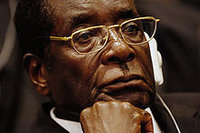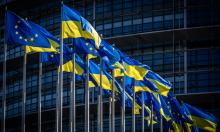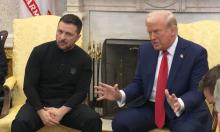African Union plays nasty Mugabe trick on Europe
At the 22nd Summit of the African Union (AU) held in the Ethiopian capital Addis Ababa, President of Mauritania Mohamed Abdel Aziz who came to power as a result of a coup was elected chairman of the organization. Robert Mugabe, widely criticized by the West, became the first deputy of Aziz. The AU has made it clear for the EU who rules on the African continent.

The 22nd summit of the African Union that unites 54 countries of the continent ended last Friday in Addis Ababa. The main topics on its agenda were the election of new leadership, military conflicts in South Sudan and the Central African Republic, and development of a long-term program for the continent for the next 50 years. 2014 was declared a year of agriculture and food security in Africa. Agriculture is expected to lead the fight against poverty and humiliation, said the newly elected chairman of the pan-African organization, President of Mauritania Mohamed Ould Abdel Aziz. He urged the countries to allocate 10 percent of their GDP for the development of the Union.
The election of Aziz was criticized in the French press. RFI radio called the vote "the election by default" because Mauritania was the only candidate from North Africa whose turn it was to chair. Algerian President Abdelaziz Bouteflika was sick, President of Tunisia Moncef Marzouki is busy with the internal situation in his country, Libya is in a state of decay, and Egypt suspended its membership in the AU due to a military coup. Morocco is not part of the organization because of the recognition by the Union of Western Sahara.
The French also called the election of Aziz "controversial" because in 2008 he organized a coup and was elected president, violating the recently adopted by the AU "Declaration on unconstitutional changes of government" prohibiting coup leaders to run for election.
The election of the President of Zimbabwe Robert Mugabe as the first vice-chairman was even more unpleasant for the West. Mugabe is criticized in the West for undemocratic elections, but in reality the fact that he does not allow robbing his country. He gave the land confiscated from the white to locals and nationalized Western companies by buying a controlling stake. The economic issues of the country are not caused by Mugabe's "mismanagement," but rather the sanctions imposed by the West.
This election is a bad sign for Africa, reported French channel RTI. One could argue that this is a bad sign for Europe that would shake hands with anyone who can prove beneficial. "Remember Blaise Compaoré, the murderer of Thomas Sankara," told Pravda.Ru Vasily Filippov, doctor of historical sciences, senior researcher at the Center for the study of tropical Africa Institute of African Studies. "A perfect killer proclaimed the best friend of France. The West praises those willing to sell African resources for pennies, even if they are dictators, and criticizes those who dare to oppose the intervention of France in Mali, even if they legitimately win elections." Indeed, Aziz, regardless of how bad he is, is one of their own, while Mugabe took a courageous stance on Gaddafi and firmly persecutes homosexuals.
The AU Summit stated that the African leaders would not attend the summit Europe - African Union on April 2nd and 3rd in Brussels if the European Union does not invite Zimbabwe President Robert Mugabe.
An important decision of the summit was to form the African rapid reaction force. Each of the five African regions (West, East, South, North, and Center) should have a rapid response unit that will take part in the suppression of the conflicts in African countries rather than relying on western intervention that often acts in its own interests. Mohammed Abdel Aziz said that the decision to create the African rapid reaction force was made because the States must provide forces to conduct operations.
The project is not new; it was proposed in 2002 but has never been implemented. The discussion was resumed when the intervention of France was required to respond to the crisis in Mali and the Central African Republic. This emphasized the impotence of Africa as a first responder in military matters.
In May of 2012, the AU countries decided to create voluntary rapid response forces. At the summit in Addis Ababa countries willing to form these forces were identified. They include Algeria, Angola, Chad, Ethiopia, Guinea, Mauritania, South Africa, Tanzania and Uganda.
But will Europe, and first of all, France let the AU implement these plans? The main question is whether Africans would find money for the creation and maintenance of their own army. Now over 90 percent of all AU peacekeeping operations, including in Somalia, are funded by the EU and the U.S. He who pays the piper calls the tune.
Peacekeeping operations do not come cheap. UN peacekeeping missions in the Congo and Darfur have cost over $1 billion per year. Nevertheless, Vasily Filippov believes that Paris would not mind. "After planting a puppet government in the Central African Republic, Paris will be happy to shift some of the burden to the AU and its allies," said the expert.
At the summit, a letter of the Chairperson of the African Commission Dr. Nkosazana Dlamini Zuma was distributed where she described her vision of Africa in 2063. The continent will be free of conflicts, hunger and malnutrition, disease and poverty, and the created Confederation of African States will become a permanent member of the UN Security Council. Languages of former colonizers will cease to be means of communication and will be replaced by local languages such as Swahili, and big cities of the continent will be connected with high-speed trains. According to Zuma, 50 years from now Africa will have its own space agency, Kinshasa (Democratic Republic of Congo) will outshine Paris and Milan as a fashion capital, and chocolate connoisseurs will prefer to buy chocolate from Accra (Ghana) rather than Brussels.
Lyuba Lulko
Pravda.Ru
Subscribe to Pravda.Ru Telegram channel, Facebook, RSS!





